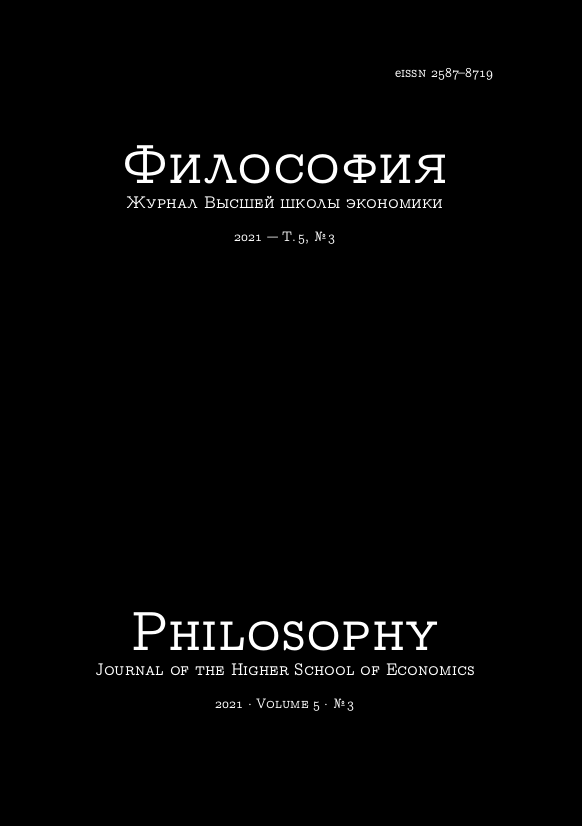Dostoevsky's 200th Anniversary
Abstract
The reason to turn again to the work of F.M. Dostoevsky's - his 200th anniversary - is both unique and ordinary. Unique, because such an important date in itself obliges a lot. Ordinary - because even without jubilee occasions, turning to the texts of the great writer has long become commonplace for any thinking researcher. Moreover, nevertheless, realizing both circumstances, the authors of the jubilee issue took the liberty, if not to try to find something little spoken in connection with Dostoevsky, then nevertheless speak out taking into account the height of the years passed after his life.
The first article is written by Denis Berezhnov, a postgraduate student at Moscow State University. It is dedicated to the aesthetic-utilitarian debate developed by Dostoevsky in The Demons, which has become especially relevant for our time. The following two articles - by Sergei Nikolsky (Institute of Philosophy RAS) and Grigory Tulchinsky (National Research University Higher School of Economics, St. Petersburg) directly correlate the writer's thoughts with problems significant for the Soviet era. The first article - through the study of temporal existential meanings; the second - through the analysis of the consequences of implementing the program of social reorganization. Continues the issue the article by Vladimir Katasonov (Saint Cyril and Methodius Institute for Advanced Studies) dedicated to the relationship between Dostoevsky and phenomenology. The following three articles are devoted to the peculiarities of previously little-studied aspects of Dostoevsky's works' philosophical and artistic content. Nikolai Murzin (Institute of Philosophy, RAS) analyses the phenomenon of misfortune. Ksenia Koroleva, a postgraduate student at the Institute of Philosophy of the Russian Academy of Sciences, studies the phenomenon of gambling basing on Dostoevsky's novel The Gambler. Yulia Erokhina (NRU Higher School of Economics) attempts to simulate the image of the pale world as seen in the novel Crime and Punishment. According to Denis Kacheev (Kostanai Branch of Chelyabinsk State University) and Sergey Kolchigin (Institute of Philosophy, Political Science and Religious Studies of Committee Science of the Ministry of Education and Science of Kazakhstan), Dostoevsky was one of those who began a spiritual quest in Russian philosophical thought. In the final article of Dostoevsky's section, Inna Tiguntsova (University of Toronto, Canada) attempted to compare his work with other writers. In her article, she compares the images of birds in Dostoevsky's novels "Poor People" and "The Sorrows of Young Werther" by Goethe.
The rest of the Studies' section consists of the articles by Andrey Teslya (Institute of History St. Petersburg University; Immanuel Kant Baltic Federal University) "The Slavophiles and the" Polish Question "in 1840 - the 1st half of the 1860s" and Anton Borovikov (RANEPA, EU at St. Petersburg) "Materialistic Modernization of Russian romantic nationalism. According to the notes "On the mutual relationship of the people, state and society" by Ivan Aksakov (1862)".
The issue also contains a translation into Russian of Skinner, Valsiner and Holland's article "Discerning the Dialogical Self: A Theoretical and Methodological Examination of a Nepali Adolescent's Narrative". The translation was done by Diana Gasparyan (NRU HSE).
The book reviews' section includes the reviews: by Artyom Morozov (Institute of Philosophy RAS) on the Russian translation of Steve Fuller's "Post-Truth: Knowledge as a Power-Game"; by Dmitry Davydov (Institute of Philosophy and Law of the Russian Academy of Sciences (Yekaterinburg) on the Russian version of D. Harvey's "The Condition of Postmodernity"; by Alexander Markov (RSSU) on Alexander Montlevich's Wakefulness Madness: Speculative Realism and Lucid Dreaming; and by Alexander Pavlov (Institute of Philosophy RAS) on the Russian version of Bernard Perron's Silent Hill. The Terror Engine.
S. Nickolsky
Downloads

Copyright (c) 2021 Philosophy. Journal of the Higher School of Economics

This work is licensed under a Creative Commons Attribution-NonCommercial 4.0 International License.





